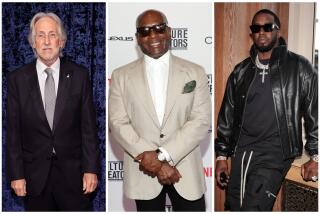What Does the Future Hold for Revamped Destiny’s Child?
- Share via
Destiny’s Child’s second Columbia Records album, “The Writing’s on the Wall,” has been in the national Top 20 for three months, with 2.5 million copies sold and three No. 1 singles, making the quartet the most successful female pop/R&B; vocal group since TLC. After 10 years of hard work, the four childhood pals from Houston, all now 18, should be celebrating a dream come true.
But instead they’re at war.
Destiny’s Child original members LeToya N. Luckett and LaTavia M. Roberson filed a lawsuit March 15 against the group’s manager and executive producer, Mathew Knowles, alleging he stole their money and threw them out of the group when they tried to seek new personal management.
The suit also says Luckett and Roberson were replaced without notice by two new singers, Farrah Franklin and Michelle Williams, who, along with founding members Beyonce G. Knowles and Kelendria T. Rowland, are listed as co-defendants in the petition. The civil suit was filed in Harris County District Court in Texas, and seeks unspecified real and punitive damages.
Luckett and Roberson say they found out they had been replaced when they saw the video for the single “Say My Name” premiere on Black Entertainment Television, with the new members lip-syncing to tracks Luckett and Roberson had recorded.
The Destiny’s Child turmoil is the latest example of a pop act’s future being either threatened or torn apart by struggles for control among group members or conflicts with management or record companies. It’s a list that extends from the Beatles and Pink Floyd to N.W.A and TLC.
In the case of Destiny’s Child, the nature of the skirmish is particularly ironic if you believe the suit, because the group became popular--even winning an NAACP Image Awardthis year--in part because of lyrics that criticize irresponsible men who use women’s money instead of their own.
Mathew Knowles is the father of Beyonce Knowles, the group’s lead singer; he is also Rowland’s legal guardian. The lawsuit alleges the elder Knowles tried in vain to gain guardianship of Luckett and Roberson, and paints a nightmarish picture of life under his control, with his micro-managing every aspect of the young women’s lives.
The suit also says Mathew Knowles wrote his own contracts, refused to share financial information with the girls and their parents, and “made money from the girls’ work while the girls themselves made virtually no money.”
“The allegations are totally untrue,” Mathew Knowles said this week. “We are both prepared and ready to go to court to prove that.”
Knowles also said the rift has helped, not hurt, record sales, and said the two new singers have “improved us visually and vocally.” He says he owns the name Destiny’s Child as a Texas corporation, and can therefore choose who the members are.
Columbia Records spokesman Larry Jenkins said the label has no comment on the lawsuit. Asked about ownership of the group name, Randy Bowman, a lawyer for the plaintiffs, said Knowles’ claim of ownership “only shows how little he understands about corporate law.”
Beyonce Knowles said in a separate interview that Luckett and Roberson left the group due to “creative differences,” quoting nearly verbatim from a statement released by her father’s office. Luckett and Roberson insist they never left the group at all, but were illegally replaced when they attempted to fire Mathew Knowles.
The suit says Roberson met Beyonce in 1990, when they were 8 years old, at auditions for a local vocal group in Houston. Both girls were chosen from 65 hopefuls to be part of the group, managed by Andretta Tillman, the suit adds. One year later, Roberson says, Rowland joined the group. Soon after, Mathew Knowles took over as manager. Luckett joined the group when she was 11.
Beyonce said that her father saw great potential in the kids, all of whom grew up singing in church, and quit his job as a “neurosurgical specialist” in order to groom them for stardom.
“He basically gave up everything,” she says. “He trained us. . . . We had summer camps at my house, and my mom and my dad got up early and went jogging with us. They hired a vocal coach, and taught us interviewing skills. He rehearsed with us nine hours a day. I was blessed to have a parent who cared so much.”
Luckett and Roberson remember the “summer camps” somewhat differently, saying Mathew Knowles controlled what they ate, whom they socialized with, and how much time they spent with their parents.
The group performed locally, opening for national acts such as Dru Hill and SWV when they came to town. Then, when the girls were 15 years old, Beyonce says, a Columbia Records executive saw them perform and flew the group to New York for a showcase. They were quickly signed to the label.
“I based my concept for them on the Supremes and En Vogue,” Mathew Knowles said of the camp-like training, adding, “but, of course, those groups had problems too. I think when you have all-female groups like this, unfortunately business decisions get made that are a little too emotional.”
That type of “sexist attitude” is part of the reason Roberson was uncomfortable with Mathew Knowles, she says.
The group’s self-titled debut album, released in 1998, has sold 500,000 copies to date, according to SoundScan. It featured the hit “No, No, No,” remixed by Wyclef Jean.
The second and latest album, “The Writing’s on the Wall,” featuring the hit “Bills, Bills, Bills,” is still No. 9 after more than eight months on the national chart.
The lawsuit is the second filed against Knowles in relation to Destiny’s Child. In ‘98, Luckett and her mother, Pamela Luckett, filed a suit in Harris County against Knowles, after he allegedly refused to provide them with an audit of the group’s finances. They settled out of court.
The elder Luckett also complained that Knowles had police forcibly remove her from a tour bus in Baton Rouge, La., when she had come to the aid of her asthmatic daughter.
Late last year, the younger Luckett and Roberson sought legal advice from Bowman and co-counsel Gerald Conley. The lawyers informed the young women that upon turning 18 they were no longer legally bound to contracts signed as minors. The singers wrote to Knowles to say they intended to terminate their contract with him, but had no intention of leaving the group. In the ensuing months, the lawsuit alleges, Knowles did not respond to the letter. Furthermore, it says, he neglected to tell the singers about upcoming performances and obligations, and then informed Columbia’s parent company, Sony Music, “that Plaintiffs were failing to perform under their recording contract despite knowing full well they were the cause of any such failure.” Knowles then replaced Luckett and Roberson with Franklin and Williams.
Lawyer Conley said that he and Knowles were “talking about talking” and hoped to settle the case out of court. Mathew Knowles, however, told The Times he has no interest in a settlement.
More to Read
The biggest entertainment stories
Get our big stories about Hollywood, film, television, music, arts, culture and more right in your inbox as soon as they publish.
You may occasionally receive promotional content from the Los Angeles Times.










